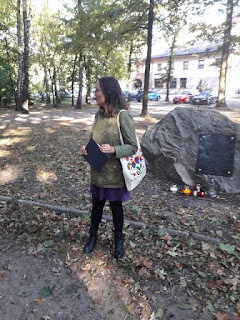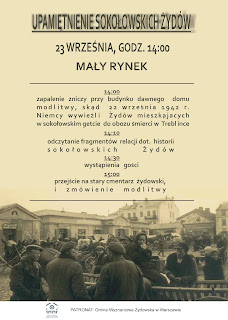Dear Kasia,
I never imagined that it would be so hard to write about my trip. Arrived to Sokolow Podlaski in the evening, I moved into the hotel and went for a walk, just after a few steps I discovered the places I had seen in pictures. Suddenly everything was so close, I could touch, I could smell. Just in front of the hotel the first surprise, the old Jewish cemetery with a sign that says: "cmentarz zydowski, przechodniu uszanuj spokoj zmarłych" - "Jewish cemetery, passerby respect the peace of the dead".
Turn right and immediately recognized the synagogue building, in front of the beit midrash, a few meters and reaches Dluga street and I could see the monument to Brzóski my heart speedup there: I was in front of my father's house. While I knew for some time ago that the house no longer exists the proximity to the place where my father lived during his early years gave me a shock.
During my stay in SP passed by this place many times, many times took pictures of the place trying perhaps to capture something that my eyes could not see. How were the days when even the street called Rogowska, Jews filled the streets, the square, the market, certainly talking aloud, creating a soundtrack that disappeared 70 years ago.
My family had a transport company (moved by horses), according my uncle his great great grandfather had started the business and was established in Rogowska street, a two floor house with an exit to Piekna (where they kept the horses, carriages, sleds and other tools) in the front of the house were a couple of shops. Every Thursday when the market worked anti-semitic groups came inveighed against the traders, my grandmother called my father and my uncle home and from behind the door they heard the screams, people running ... and so every Thursday, an almost routine in the life of the inhabitants of SP.
Tried to listening to the echoes of those sounds; I only had the silence of the evening in the city, almost deserted streets. Again I closed my eyes trying to identify in the old photos of the city my grandfather and his brothers with their carriages, those faces I never knew; nothing was left of them, only their names which we still carry generation after generation.
At that moment I realized that I was the only Jew in SP, me alone in a city which is said: "A visitor to Sokolow in 1930s could not walk 10 feet down the street without bumping into a Jew"
The next day I had the luck and privilege to meet you in person. After a long exchange of emails, photos and following your virtual projects finally were there, along with your child ready to take the tour created by you : "Jewish SP". Again, I saw each of the places so well documented in your "Missing" project, toured all stations along the way trying to revive this incredible place that was the home of my ancestors.
Every moment shared with you, walking around the town, visiting Treblinka, the trip to Siedlce, the ceremony in Maly Rynek, the chat with students in the school, the visit to the cemetery at the grave of someone who was born a Jew and decided to end his life as a Christian, each of these moments will remain in my memory forever and for each of them I will be forever grateful.
I spent only a few days at SP, emotions were a lot like the feeling of surprise, feeling that even today several days after returning home I cannot understand.
That morning in which visited Marian Pietrzak's Museum did not expect such a surprise, as everyone of our friends who visited SP just expected to see the remains of the matzevot and other Jews' utensils recovered by Mr. Pietrzak, he greeted me, I told him that I am from Israel and that my family was from SP. Asked about my family name: Angielczyk, I answered. He opened his eyes and held the breath for a moment took my arm and led me to a small carriage, a "doroshka" and told me that it was from my family. At that moment besides the feelings I was able to see for the first time a link to my past. There was this carriage that survived so long, 70 years until I arrived to SP and saw it.
There are several images that marked me deeply, the mass grave at Piekna, the mark of the mezuzah that once stood in that old house alongside Maly Rynek, the kind gentleman that after the lighting of candles in the old cemetery gave me two oat nuts from the trees that grow there, maybe as a sign to remember the cemetery that no longer exists, to have something in place of the matzevot that were razed.
Every moment was very emotive; every step I took tried to find something last of many generations of Jews who lived there but the silence that remained put me back in my position of being the last Jew in town.
Warm regards,
Eduardo















































